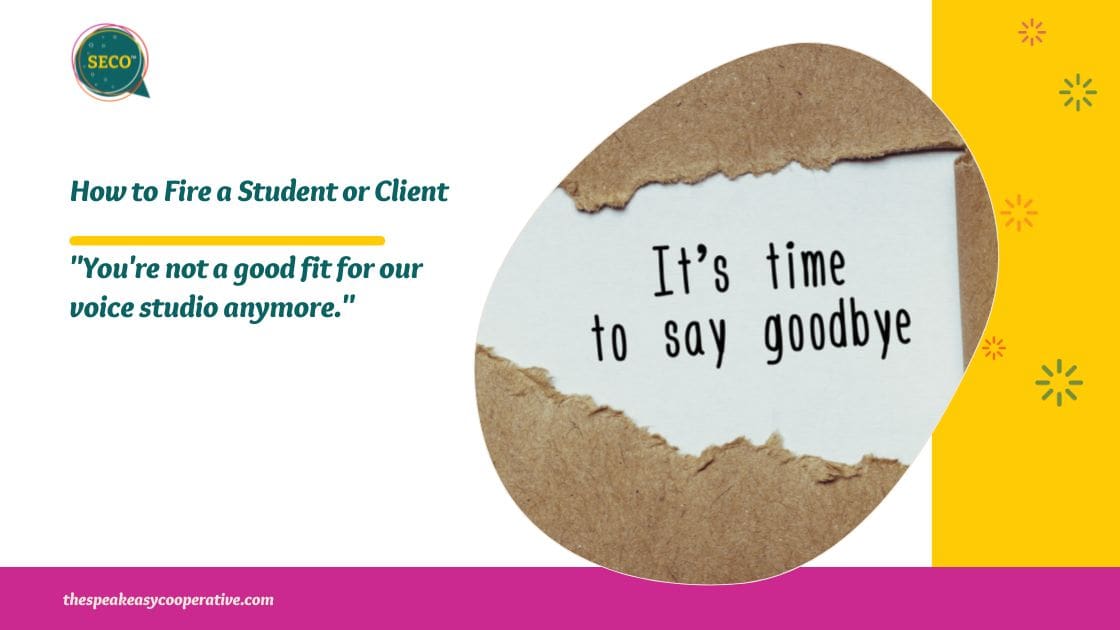It happened again. The post in a voice teacher forum. A frustrated and irritated teacher asking – “How do I fire a student?” OOOFFFF, I’ve been there, for sure. Yet, we sometimes struggle with how to tell a student they aren’t a good fit for your studio anymore. Before I do, I wanted to share some thoughts.
Have you ever had this happen?
- The student is being disrespectful, rude, or isn’t wearing pants.
- The parent keeps paying late…. even after six text messages, two emails, and a carrier pigeon.
- General malaise. Are they asleep? In the bathroom? Helllooooo from the other side!
Yeah, me too.
Now, what struck me most about the post I mention above was that the answers, while extremely well-meaning, and intended to support this weary teacher, included some variation of, “tell them your schedule changed” or “I’m already booked up”.
This made me uncomfortable. And when I get uncomfortable, I start asking questions.
Why did teachers encourage a “lie”?
I’ve got some ideas about this…
- Fudging the truth saves us from conflict. Conflict has such a bad wrap. Conflict, in and of itself, is actually quite helpful. In fact, the ability to work through conflict brings immense freedom and joy! What is not so fun is how people respond to conflict – and that is what we are working to avoid.
When we tell the truth, we risk putting ourselves in a situation that will bring up trauma from other times we told the truth and it didn’t go so well. Maybe some people quit on us. Others may have bad-mouthed us. Still, others insisted upon misunderstanding us.
When we tell the truth to folks, and allowing conflict to come up, we risk a bad reaction to that conflict. And because will always respond to us from their trauma/wellness, if they do behave in an overly jabby or defensive way, we fawn.
- We performers are conditioned to believe in meritocracy. Remember back in your youth performing days, early on, when “the kid with the best voice” got the role? Well, before we really knew better, that process implicitly taught us that casting is simply a matter of talent. That the merit of the voice was what got us role, or the gig.
If our talent made the director feel a spark, we were rewarded with a role. We absorbed the message that our voices are what makes people happy.
It wasn’t until later, after we were well out of high school musicals, that we realized hiring/casting for the grand puzzle-piecing it is.
Of course, we now know that is hardly true that the best singer gets the part. Out of a group of great singers, one person gets the part because they fit the image of who the director has in their mind, or they have the right color skin, or they have the right connections, or they just may be a blast to work with. Merit plays a role, of course, but it’s one small piece of the puzzle.
This misinformation does a great disservice to us as we step into business ownership. As the myth of meritocracy plays out in voice studios, we begin to think if we are the best voice teacher, we will get the best students and clients – and we’ll never have to worry about whether a student is a good fit or not. If the student turns out to be a not-so-good fit? Here’s the kicker: We’ve internalized that this indicates we aren’t a very good voice teacher.
If we remove meritocracy from the equation, we can imagine a world in which we prioritize fit over personal validation of being picked or being the best. When we prioritize fit, we can balance a student’s needs, practice style, and goals against how we can best serve a student—and make a decision about whether to extend an agreement for study to that student. - We don’t spend enough time teaching our students how to be students. Alas, I am pained that we don’t get to bathe in the soothing mud baths of pedagogy all day. We have the added responsibility to teach our clients (sometimes this includes the parents of clients!) *how to be students and clients.*
This includes what it means to be in our studio culture and how to fit with our expectations. We need to teach them about professional relationships, and how to read agreements, and how to value us. Why? Because they do not know yet. Even if we think they “should know by now”, they don’t. We are the ones who teach them to honor us.
Oh, and sorry again, folks, handing over a two-page agreement and expecting them to remember what was on it does not create your studio culture. Worse, to the client, it feels disingenuous when we refer to “the policy” when it hasn’t been mentioned after the first lesson.
Find ways to communicate your policies and create agreements around expectations DURING the lesson. For example, during your breath-readiness exercises, you can mention, “I’d love for you to do this every day, just as we meet every week, consistency is key!” or “I can’t wait for you to send my your virtual recital videos! I love your commitment to performing and how it aligns with the core values of the studio!”
At the end of the day, Dear Ones? “I want something else” is enough.
You create your studio culture. You pick your clients. You are allowed to not like, or want to work with, every person that comes your way.
We do our most impactful work when we build policies that line up with our pedagogy. When we create agreements that just make good sense.
My guess is that if you’re reading this, you do your best to “do no harm” when it comes to teaching the art of singing. You’ve got a pedagogy that takes into account the consistency and commitment of working toward a specific skill set. You take great care in teaching tone, breath, intention, subtext development, vowel formation, etc.
I invite you to create policies that are just as intentional as your pedagogy. If you believe that consistency is important, require it in your policies when people choose to study with you. If you believe in meticulous and dedicated time, require that in your practice policy. If you value teaching artists to charge appropriate fees and set themselves up for the self-employment success of being an artist, then charge an appropriate fee and set yourself up for self-employment success.
How you choose to word it is based on who you are, and your comfort level.
Your studio policies can make your students a better fit for you and your studio. And, they can give a structure for knowing when a student just isn’t a good fit.
There will always be times when the most honorable and just move is to simply move on.
Here’s the juicy stuff: how to tell a student they aren’t a good fit for your studio anymore.
Next time it’s time to say goodbye, try one of these phrases on:
“I’ve been reviewing our time together over the last several months, and it seems that your needs and the studio’s policies are no longer in alignment. It’s best if I release you from our agreement so you can pursue a studio that more effectively fits your needs.”“At this time, our work together isn’t as productive or useful as it once was. It’s time for the studio to release you to find someone who can serve your needs better.”
“Thank you so much for being part of this studio! We’ve done the amount of good work that we were able to do. As of [insert date], our contract will be over, and you’ll be able to find your next great teacher.”
You do not need to explain yourself based on guilt, or “shoulds”, or “what-ifs”. You don’t need to couch information in a way that “protects”. You don’t need to feel fear for your decisions. You can own them 100%.
Some of the above examples may feel too direct at first. I assure you, direct and clear will get you toward your desired result of releasing a student to their next adventure a whole lot easier than trying to make it “sound nice.”
I’d love to know from you how you expect to “bless and release” those who are no longer a good fit. Do you have any go-to phrases or invitations? Comment below and let me know!
All My BeastyBoss,

P.S. for more ideas on this, head over to this blog I wrote around Christmas, last year!
P.P.S Have you seen the last round of SECO Shoutouts? Head on over to FB and leave a comment about what YOU have accomplished this week!






0 Comments